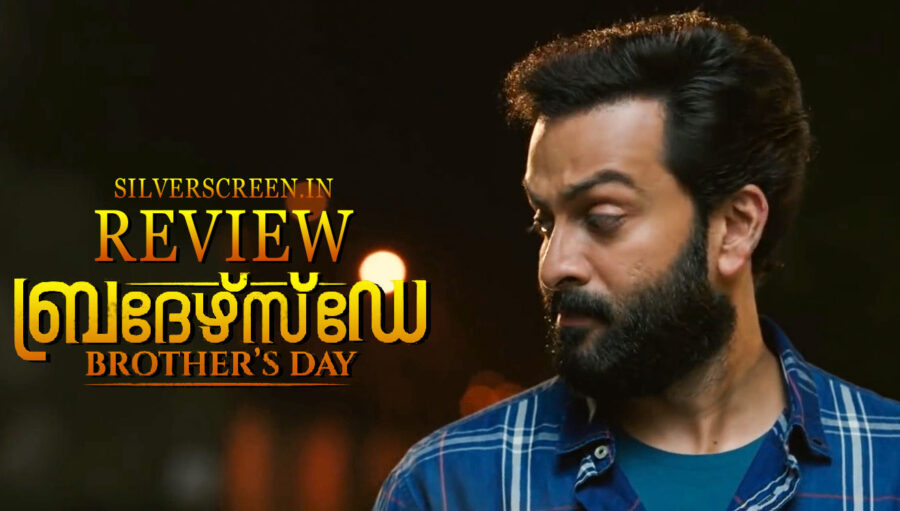Kalabhavan Shajohn’s directorial debut Brother’s Day is excessively invested in a certain trivia about Prithviraj Sukumaran’s career. Over the last three years, the actor had been doing a string of thrillers and dramas where his dialogues weighed like boulders and the air was always dark and cold. Several times in the first half of Brother’s Day, Prithviraj breaks the fourth wall and makes jokes about returning to the ‘mass entertainer’ turf. His co-characters push that beneath his inherent urbaneness, Prithviraj is a man-next-door who loves loud humour, who speaks and behaves like a small-towner, and can rock a lungi better than anyone else in his generation of actors.
So much stress is laid on Prithviraj’s off-screen persona that there is a chance you will never learn or remember the name of his character in the film. Maybe, it doesn’t matter. The film doesn’t make any effort to mask the pretentiousness in his performance or his inability to be the character. He delightfully hams up and the film celebrates the fact that he doesn’t fit into the world of his co-stars such as Dharmajan who specialise in this kind of potboiler. He suspends himself in the film’s atmosphere like Shashi Tharoor in rural Thiruvananthapuram, congratulating himself for trying out this exotic local genre.
The film, though, begins on a promising note. In a Tamil Nadu village, a boy in his early teens quietly endures the harassment of his step-father. He loves his now-pregnant mother to bits, and is awaiting the arrival of a baby sister. The scenes have a strong influence of theatre, and there are some nice touches. The boy, at one point, steals a bottle of milk from a neighbour to feed his wailing baby sister. The woman of the house catches him red-handed, but instead of a stereotypical scene, we get a humane, sensitive moment. She helps him take care of the child. The actors are great, and there is a good restraint in the way scenes are staged – this is interesting because these qualities are completely lost in the rest of the film.
Brother’s Day is a quintessential potboiler that has a colourful choreographed group dance sequence, many instances of stylised violence, gorgeous women, and stunt sequences forced into the narrative to flaunt Prithviraj’s mass hero image. He plays Rony, who works in a tourism and catering business run by Joy (Kottayam Nazir). For the simpleton that Rony is, life is a struggle because his perfect hair, skin and smile never go unnoticed by strangers. Every woman he comes across compliments him – subtly or otherwise – on his good looks. His best friend (Dharmajan) can’t get married because the women he goes to with a marriage proposal pick Rony over him. His life changes overnight after he befriends a guest Chandy (Vijaya Raghavan) who lands in his homestay in a case of mix-up. They, along with Jema (Madonna Sebastian), the pretty daughter of a loyal client George (Spadikam George), pub-hop, shop, and go on bike rides.
Brother’s Day shares many resemblances with Nadirshah’s directorial debut Amar Akbar Anthony, which had Prithviraj as one of its lead actors. In both the films, the villain is a paedophilic/sex-crazed non-Malayali. He exists in the same world as the protagonists, but in a parallel plot-track that collides with the main track only in the second half. It is as though the filmmaker wants to tell the audience, “Okay now that you’ve had a lot of fun, here is some mystery and violence.”
Miya George essays the film’s strangest character Thasni. The eldest daughter of a rich conservative Muslim household, she transforms into a Lara Croft-like figure in a short span of time after the villain threatens to ruin the honour of her family using some unflattering photographs of her late father. Not only does she participate in his honey-trap business, she also helps him chase down and fight enemies like a professional.
The film cooks up a ‘sentimental’ history to validate Jema’s drinking habit – her mother was an indifferent socialite. However, the film’s male characters, who are rarely seen sober in the initial half, get no story. The film seems to believe that men drink because they like to drink while women drink only to cope with a bitter memory. You might also find the film’s use of charity as a plot device unintentionally comical. Jema likes to do charity in her free time. Rony chances upon her at an old age home, and falls in love with her good heart. Thasni, after her ordeal is over, returns to funding social weddings. Santa (Aishwarya Lekshmi) owes her life to a charitable trust.
Recommended
Prayaga Martin is surprisingly good here as Ruby, Rony’s chirpy little sister who hasn’t been anywhere outside her village. Aishwarya Lekshmi, who gets the meatiest role among the female artistes in the film, does a neat job as a damsel in distress. Prasanna’s portrayal of the psychopath is believable to a great extent, although the film completely ignores the legal aftermath of the crimes that he commits. He leaves a trail of evidence all the time, but no one goes after him. It isn’t an anomaly in Brother’s Day because it is designed to be a casual no-brainer – one-time watch, if you may – which works best when you force suspend your critical and rational faculties and believe what is shown on screen.
***
The Brother’s Day review is a Silverscreen original article. It was not paid for or commissioned by anyone associated with the film. Silverscreen.in and its writers do not have any commercial relationship with movies that are reviewed on the site.



